A farm-to-table nutrition education event called Harvest of Hope brought a community together to share the importance of local, seasonal foods. You can too! In this three-part series, we share information on how seasonal, local plant foods within a nutrition education community event can help reduce the risk of cancer and other chronic diseases.
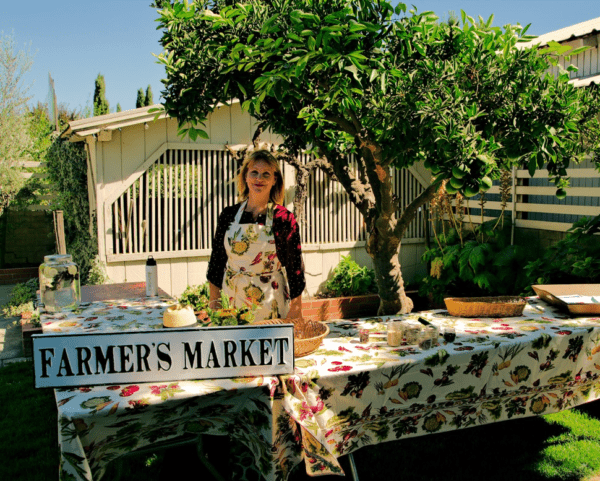
Sharon Palmer, MSFS, RDN, teaching a sustainability class on the farm during Harvest of Hope.
Harvest of Hope, a farm-to-table food and nutrition workshop hosted on a working farm in Modesto, California, shows how powerful it can be to bring nutrition education into a community. A dietitian with a dream (me!) teamed up with community outreach coordinator, Cheryl Casey, of our sponsor hospital in Modesto, Sutter Health’s Memorial Medical Center, to bring these truly special opportunities to the community: a dietitian teaching a nutrition class, complete with whole, freshly grown and harvested plant foods to smell, touch, and taste; a home gardening workshop with information and garden spades to educate and motivate guests to grow their own vegetables; a local chef doing a cooking demonstration. The potential is limitless. A nutrition education event like this is an opportunity to bring a community together to encourage cancer prevention through farming, local food, and nutrition. Read about more about Harvest of Hope in the first blog of our three-part series on community nutrition education here.
Food has the power to heal. Research shows that a diet rich in a variety of plant foods, such as vegetables, fruits, whole grains, beans, nuts and seeds, can reduce the risk of many cancers. This eating pattern has the power to nurture optimal health and bring our community—family, friends, co-workers—together with love, care, conversation, and laughter to create traditions and memories.
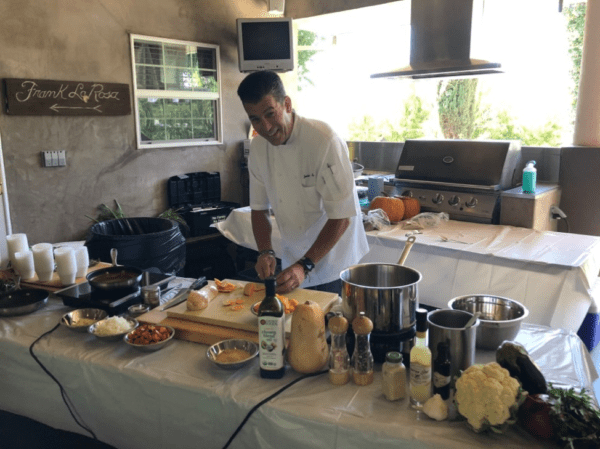
Chef Jesse in his cooking class.
Hands-On Education
Dietitians are front and center at nutrition education events. They explain how simple it is to protect against cancer and disease with a plant-based diet focused on plant-forward dishes, such as rustic pots of cooked beans, rugged kale salads, whole grain pilafs, and farm fresh fruit crisps. It’s important to emphasize that no food by itself can protect against cancer. Although many foods like garlic, broccoli, and blueberries each have individual vitamins, minerals, and phytochemicals that have shown anticancer effects, research shows it’s the variety of plant-based foods and the synergy of their compounds that offer the strongest protection against cancer.
Show people freshly harvested vegetables and fruits, or let them pluck berries from the vine and pull carrots from the earth. While doing so, explain how these fresh, seasonal foods are packed with phytochemicals containing antioxidant properties that help protect the cells in their body from harmful compounds in the environment and they will likely remember. Connecting people with these foods and the reasons why they should eat them becomes an experience they may be more likely to remember and put into practice at home.
Nutrition Education on the Farm
The community clearly wants a deeper connection to local food and health! Last summer’s second annual Harvest of Hope event at the La Rosa Family Farms in Hughson, California had over 340 guests, almost 100 more than the event the year before. Cheryl Casey, Memorial Medical Center’s community outreach coordinator, once again outdid herself. The event would not have been successful without Casey and Memorial Medical Center’s sponsorship, not to mention the La Rosa Family and scores of volunteers who staffed the event.
Community members gathered to meet dietitians, farmers, garden experts, and a professional chef, who fueled hungry minds and bodies with plant-based inspiration. Guests enjoyed the day on a true working farm, participating in several workshops focused on farm-to-fork practices. The event concluded with a group feast, showcasing the foods and the dishes featured and prepared during the day.
Los Angeles-based registered dietitian Matt Ruscigno, MPH, RD dug deep into which foods are actually most important for overall health and disease prevention and how you can take on a more plant-based eating style.
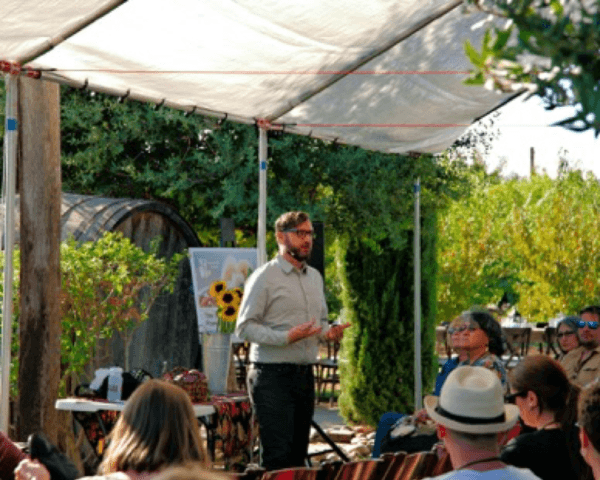
Matt Ruscigno, MPH, RD teaching about nutrition on the farm.
My workshop focused on sustainable food choices, cutting food waste, and eco-friendly plant-based meal planning. Local chef Jesse Layman and Chief Clinical Dietitian for Memorial Medical Center Todd Y. Imura, RD, MHA demonstrated how to balance the preparation of healthful meals and snacks into our busy lives, explaining how eating fruits, vegetables, and legumes can help reduce risk of chronic diseases, like cancer. Lastly, local garden experts demonstrated how to garden in small spaces, practice vertical gardening, and conserve water to encourage people to grow their own healthful plant-based foods.
Guests were so excited to learn, ask questions, and soak up ideas to take home; all the while, they enjoyed a beautiful day outdoors with their community surrounded by farms that nourish the mind, body, and soul.
Post-workshops, it was time to socialize. Guests and presenters alike gathered for a lovely setting of healthful appetizers and a local wine tasting, followed by the communal dinner. Picture long, wooden tables, adorned in lush greenery, and loops of delicate twinkling lights stretched across the center of the farm. We sat down to a dinner of hand-made pizza, farmer’s market pasta salad, roasted vegetables, and kale avocado and citrus salad. Ann Endsley, owner of local restaurant and catering company Greens, graciously supplied peach rosemary crisp. The evening concluded, leaving all high on the inspiration of food and nutrition, as well as total health, well-being, care, and community. Exactly as planned.
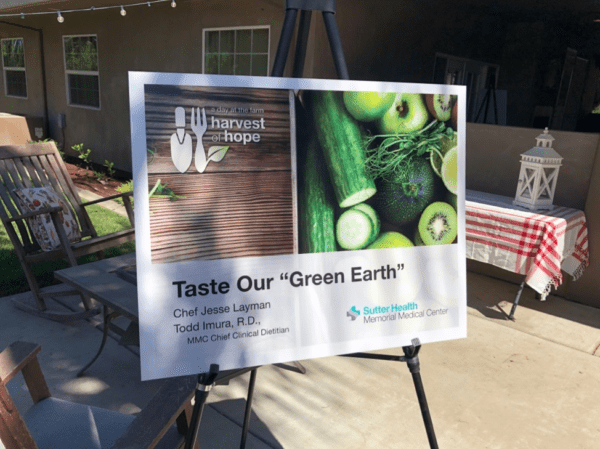
Educational session at the La Rosa Family Farms.
Next Step: Plan Your Event
A successful event takes plenty of planning. Hopefully Harvest of Hope has inspired you to jumpstart a similar event in your community. Read more here about how we planned Harvest of Hope and check out the first blog in our three-part series on farm-to-table nutrition education here. Use these tips to take your event to the next step and stay tuned for the next blog in our three-part series!
Try this delicious, easy recipe for teaching your own plant-based nutrition education workshop in your community below.
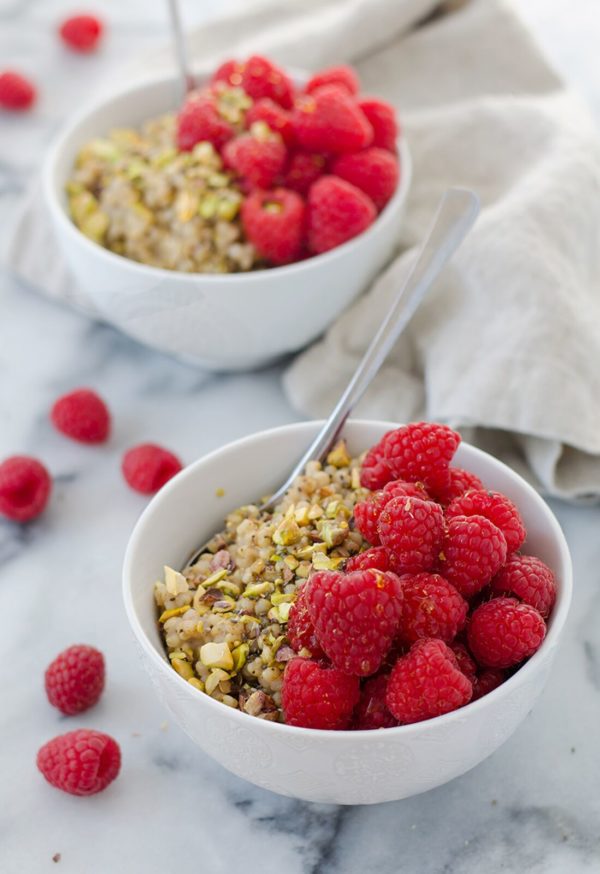
Sorghum Berry Breakfast Bowl
Raspberries, whole grains, seeds, and nuts make this a great recipe to educate about food’s power to heal.
Ingredients:
- 3 cups cooked sorghum (according to package directions)
- 1 1/4 cups unsweetened soy milk
- ½ teaspoon cinnamon
- ¼ teaspoon ground cardamom
- 1 teaspoon pure vanilla extract
- 2 tablespoons maple syrup (optional)
- 2 cups raspberries
- 1/2 cup chopped pistachios
- 2 tablespoons chia seeds
Directions:
- Place cooked sorghum, soy milk, cinnamon and cardamom in a medium sauce pot over medium-high heat.
- Bring to a boil, then reduce heat to medium and simmer for 10 minutes, stirring often, until liquid is reduced. Remove from heat and stir in vanilla extract and maple syrup.
- Divide sorghum among 4 bowls and top with berries, chopped pistachios, chia seeds and additional soy milk and maple syrup, if desired.
Serving Size: 4 servings
Calories: 355, Sugar: 10 g, Sodium: 129 mg, Fat: 11 g, Saturated Fat: 1 g, Unsaturated Fat: 1 g, Carbohydrates: 55 g, Fiber: 8 g, Protein: 11 g
Recipe by Sharon Palmer, MSFS, RDN, The Plant-Powered Dietitian, SharonPalmer.com





